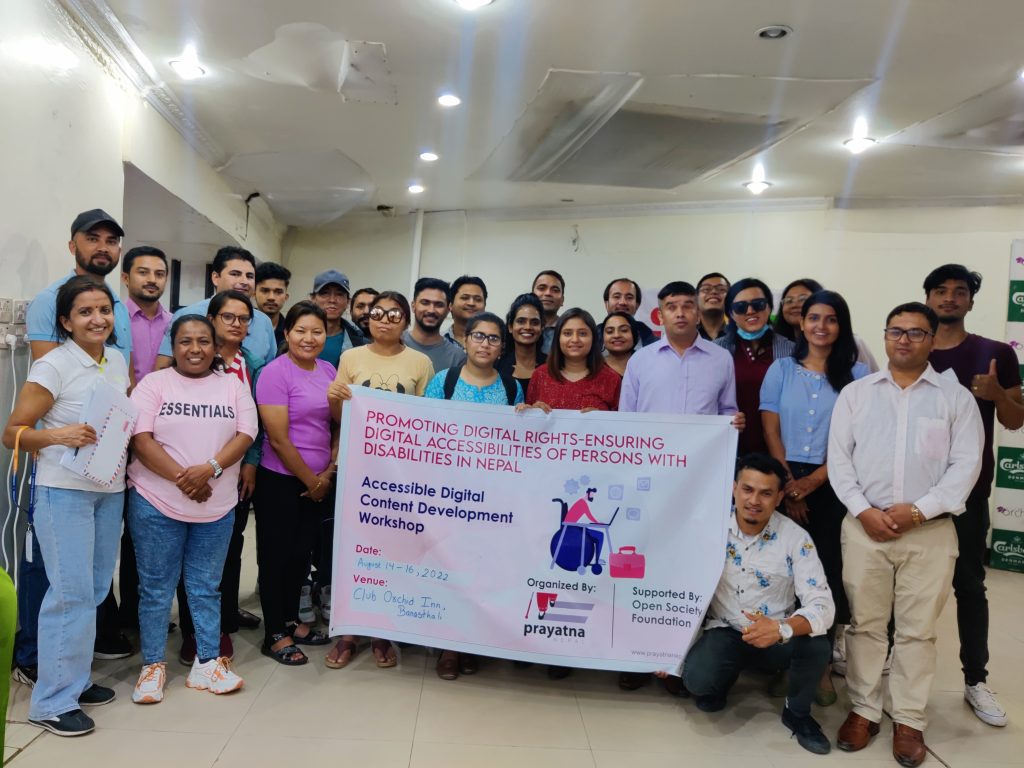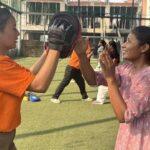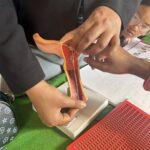
Prayatna Nepal is the self-help organization working for empowering the living condition women and girls with visually impairments. The organization is established by the composition of both women with and without visually impairments. Among the seven board members, five of them (71%) are with visually impairments where the organization is led by the totally blind woman as the Chairperson.
The first day of the event was started by Ms. Sarita Lamichhane (chairperson of Prayatna Nepal), who welcomed all the participants and shared the objectives of the workshop. She then asked all the participants and organizing members to introduce themselves before getting into the session. After the introduction round, the logistic staffs collected participant's expectations from the training while Ms. Sarita simultaneously encouraged the participants to nominate one participant as reporter (who would share overall learnings of the training), one time keeper (who would take notice of the time during sessions and breaks) and one evaluator (who would evaluate overall sharing of the training). After nomination, Ms. Sarita requested the other two facilitators (Mr. Khom Raj Sharma and Mr. Rajendra Subedi) to share online pre-test questions to individual participants in order to self-analyze the basic knowledge on disability and accessibility. After the participants filled in the online pre-test questions, the session was formally started by Ms. Sarita Lamichhane. She presented on concept of disability where she discussed about models of disability. She also explained about types of disability by showing a video documentary. She introduced this session with a method of voting where the participants were asked to vote for their preferred team (type). The voting teams were presented as political parties which in fact reflected upon the types of disability. After the participants chose their preferred team, they were asked to share about it. After the participants shared their thoughts, Ms. Sarita Lamichhane further briefed on changes in viewing disability with time. She explained that there are basically four changes: i. First, persons with disabilities were viewed with pity, ii. Later, it was believed that disability is some kind of deform which can be treated through medical procedures, iii. Then, people started looking at disabilities through social welfare lenses whereby they believed that persons with disabilities should be supported by the society, iii. Now, people have shifted their perception into being more human rights sensitive and believing that persons with disability are humans and should be treated equally like everybody. After this, she handed the floor to Mr. Khom Raj Sharma who discussed about accessibility, digital rights and its importance. He then informed the participants on domains of assistive technology. After sharing the concept of assistive technology, they were informed further about how these can be beneficial/supportive for blind and visually impaired people. Then, the participants were engaged in group work where they were made to do story analysis through which they learnt that accessibility is core to meaningful participation and right to information and services for all people. After this session, the participants were engaged in hands on activities where they learned about basic accessibility functions and gestures in their smart phones. In the seecond half of the day, Mr. Rajendra Subedi took over the session by demonstrating about accessible and inaccessible content. In this session, he further informed the participants about key features that needs to be taken into consideration so as to make accessible digital content. The second day started with the nominated reporter sharing about previous day's activities and learning, while the evaluator added to the shared content. Then, Ms. Sarita again encouraged the participants to choose one reporter and time keeper for the day. After this, she handed over the floor to Mr. Khom Raj Sharma who proceeded with his session on legal provisions of digital rights and accessibility where he mentioned laws such as, Convention on the Rights of Persons with Disabilities (CRPD) and other national laws on right to information and right to participation and access of persons with disabilities. In this session, he highlighted about Web Content Accessibility Guidelines (WCAG) and things that needs to be considered to make the digital platforms accessible for all. Then, Mr. Rajendra Subedi guided the participants on making accessible content using Microsoft Word. After giving tips to make accessible content in Microsoft word, he shared a template of inaccessible word document to all participants and asked them to make it accessible following the tips given. During this practical session, Mr. Rajendra also thoroughly guided the participants while participants also helped each other. On the third day of the training, the reporter reviewed about the previous day's sessions. Then, Mr. Rajendra took over the floor by guiding the participants on making accessible PDF and e-pub. In this session, they also learnt about things to consider to make accessible audio and video contents. He also showed some video documentary to the participants that gave clearer information on the discussed topics. After this practical session, Mr. Khom Raj shared more about WCAG and important aspects of creating accessible web content. After this, Ms. Sarita invited Mr. Prahlad Gairapipli, Communications of Handicapped International, to share his experience on accessible information and communication. After Mr. Prahlad's session, the participants were given instructions by Mr. Khom Raj Sharma on developing plan of action on making accessible digital content. After this activity, the facilitators (Mr. Rajendra and Mr. Khom) shared online post-test questionnaires to the participants to self-evaluate their learnings from the workshop. Then, Ms. Sarita asked the participants to give anonymous feedback about the three days training. At the end of the program, Ms. Sarita thanked Mr. Khom and Mr. Rajendra for facilitating the three days training and also requested all the participants to share what they learnt or liked about the training. There was a unanimous opinion that this session helped them understand and realize the importance of accessibility while creating any digital content. At the end of the program, a group photo was also taken for recording purpose. In this way, the workshop came to an end.



